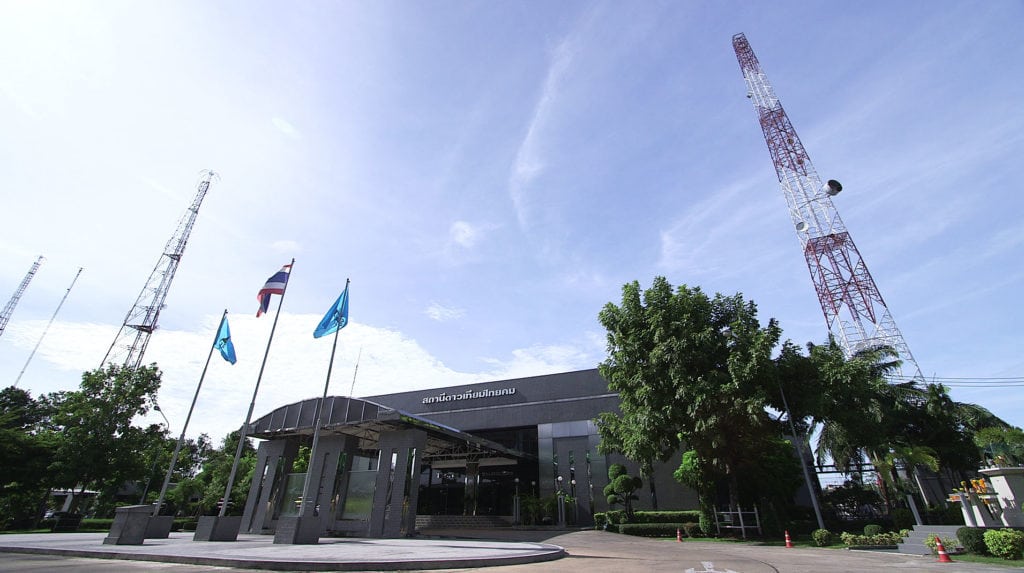Thaicom Feels Impact of Tough Regional Market

Thaicom headquarters. Photo: Thaicom.
Thaicom still has work to do as it looks to become a turnaround story over the next two years, considering the company has been operating in a tough environment for satellite capacity and services. Its latest set of full year results, issued Feb. 8, reflect this fact. The company saw a decrease in overall revenues of over 10 percent for the full year 2018, as compared to 2017. Thaicom blamed overall pricing declines for bandwidth as a main reason behind this loss of revenues, as well as customer churn. However, the company did report a net profit of $7.27 milllion (230 million Thai Baht), which was an encouraging aspect of its results. While this number was a significant improvement compared to last year, it was still well below analysts’ estimates.
Waraporn Wiboonkanarak, a satellite equity analyst at KT-ZMICO Securities, said in a research note that Thaicom had posted weaker‐than‐expected earnings in 2018 due to asset impairment. He said the turnaround in the 2018 core operation came on lower costs following last year’s asset impairment, not improvement in the satellite business. “Clarity on the future business plan will create upside to our forecasts. At this point, we retain our Underperform rating. Thaicom posted a net profit of Thai Baht 230 million in 2018, reversing from a loss of Thai Baht 2.5 billion ($75.91 million) last year. This was far below our estimate of a Thai Baht 2.4 billion profit due to the impairment of satellite assets of Thai Baht 2.3 billion following the slowdown of the satellite business, which offset the gain of Thai Baht 1.9 billion ($60.1 million) from divestment of its 42 percent stake in CSL. Stripping out extra items, its core operation marked a profit of Thai Baht 225 million ($7.12 million) from a loss of Thai Baht 2.8 million the year earlier,” he said.
However, Waraporn believes there needs to be much more progress made in the satellite business. “Revenue from the satellite business decreased 10 percent Year-Over-Year to Thai Baht 6.5 billion ($205.59 million), led by the 17 percent year-over-year reduction of broadband satellites due to churn of major customers during 2017. Although Thaicom was able to keep the utilization rate of conventional satellites stable, revenue shrank 4 percent year-over-year on the continued retreat in price per unit amidst the industry downturn,” he added.
Prasit Sujiravorakul, a satellite equity analyst at Bualuang Securities, also wrote a research note looking at Thaicom’s latest figures. In terms of the satellite business, “the satellite industry remains gloomy, thanks to oversupply and heightened competition (causing a further drop in unit sales price),” he said. “For 2019, we expect the utilization rates for conventional satellites to stabilize and for broadband satellite to rise modestly from overseas clients. Despite an 11 percent drop in 2019 revenue, its bottom-line will jump 104 percent on the cost-saving initiatives.”
However, a better regulatory environment for Thaicom could be on the way which could also offer hope for the future. “The recent share price rally has to do with the reduced regulatory risk in regard to clearer visibility after the concession expiry (such as possible business partnerships in the future between Thaicom and CAT) and the new draft of the Office of The National Broadcasting and Telecommunications Commission (NBTC) law which paves the way for Thaicom to request both the satellite license and orbital slots simultaneously from the NBTC. We changed our rating from Buy to Trading Buy, based on anticipated clearer regulatory issues in the next government,” said Prasit.
In terms of improving it satellite business going forward, Thaicom Chief Executive Officer (CEO) Anant Kaewruamvongs that “in order to further develop our satellite business, we will utilize next generation satellite technology and seek international partnerships including joint investment in order to reduce investment risk and reliance on the concession scheme in Thailand. We will also leverage our marketing and technical strengths to develop businesses that are adjacent to the satellite business, including satellite consultancy services in the areas of satellite construction, teleport services, sales and marketing, as well as system integration of satellite and related communication networks. Moving forward we will venture into new business areas with a focus on digital and future technologies to diversify the company’s portfolio and reliance on the satellite business.”